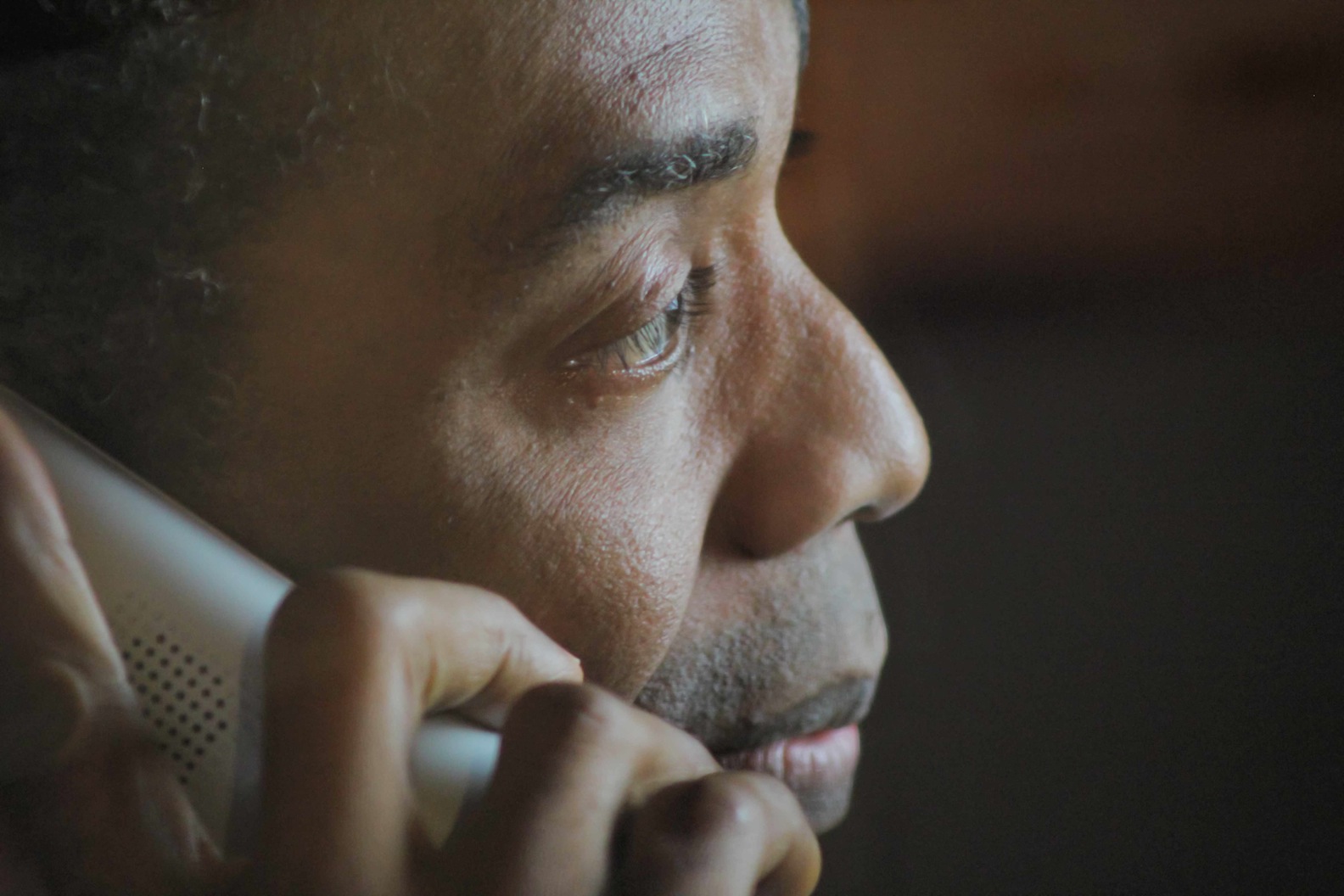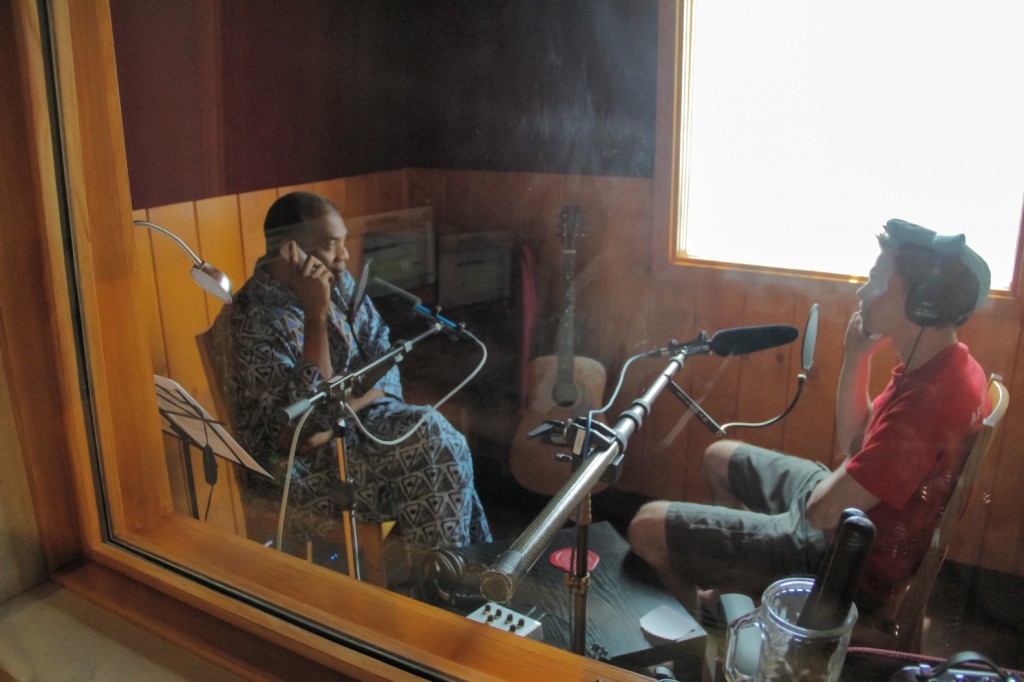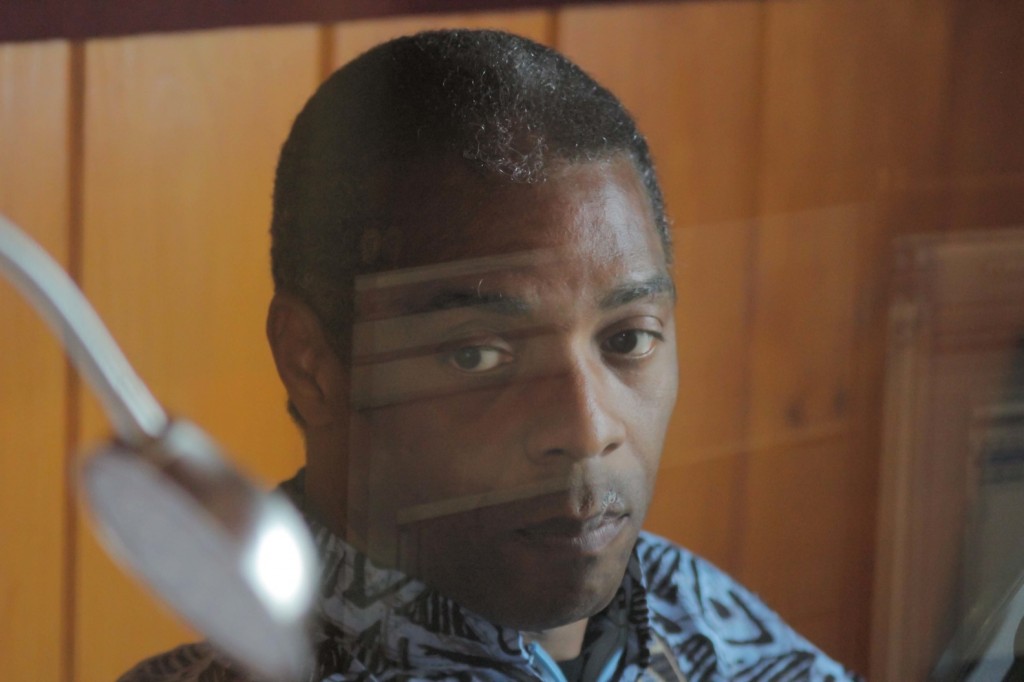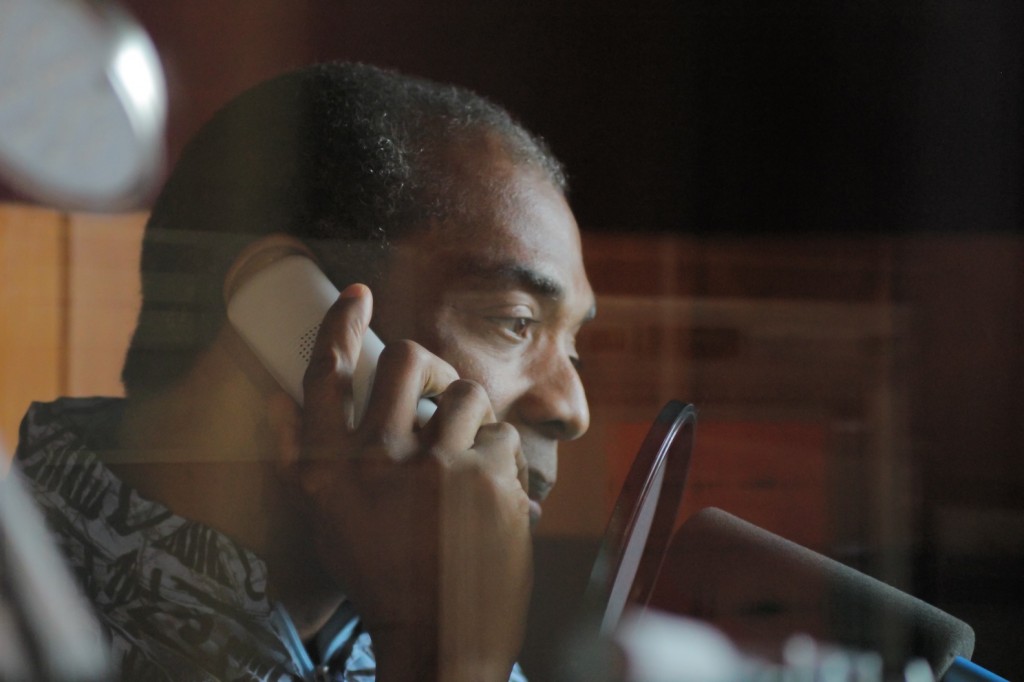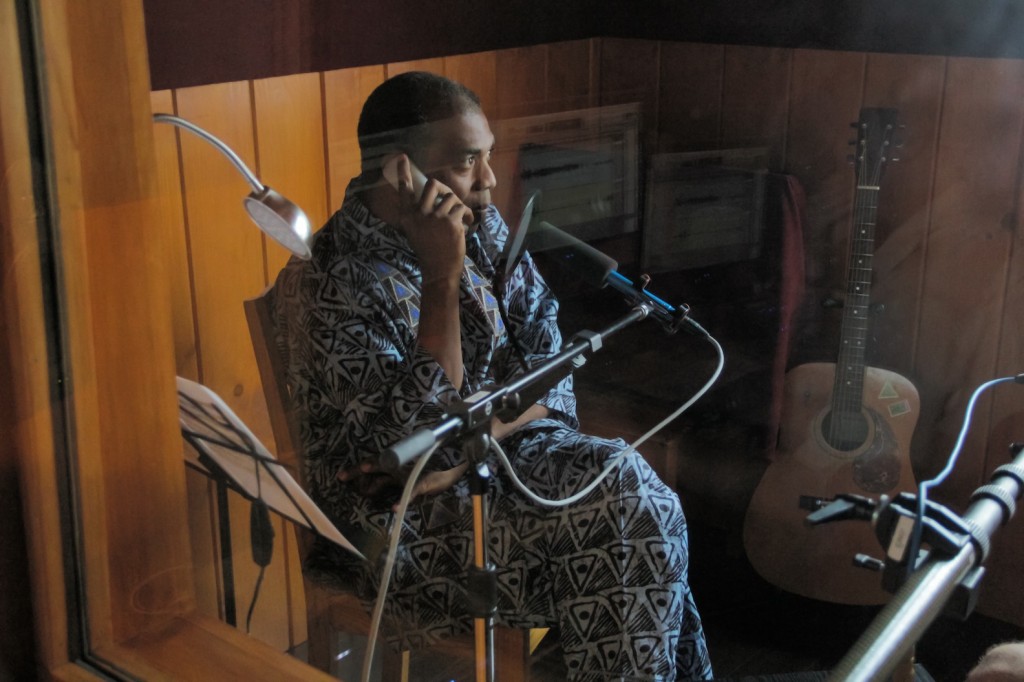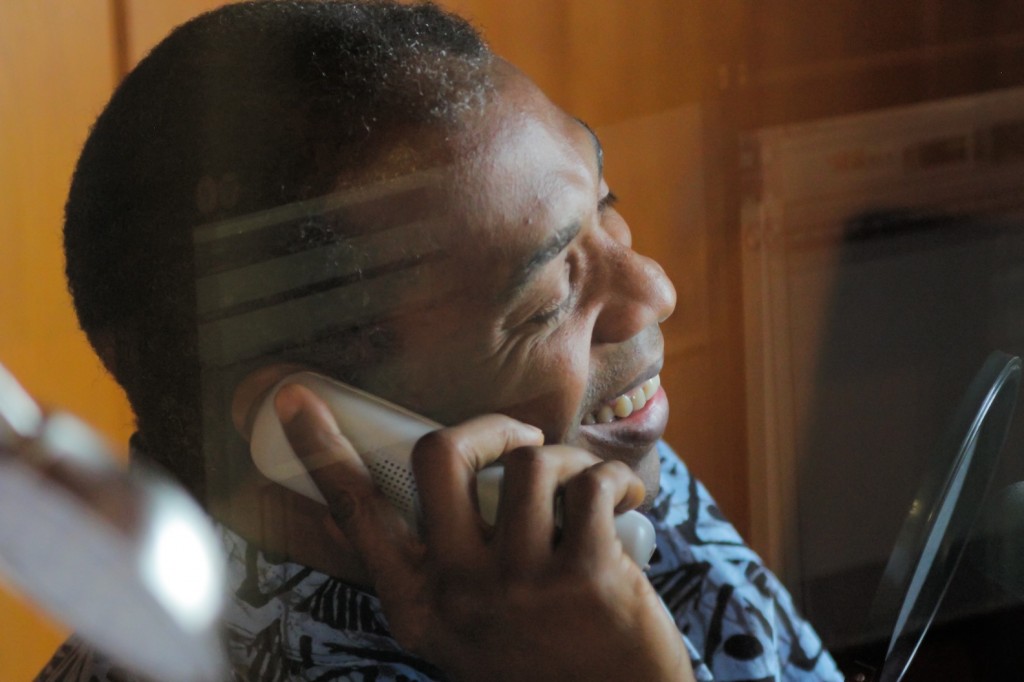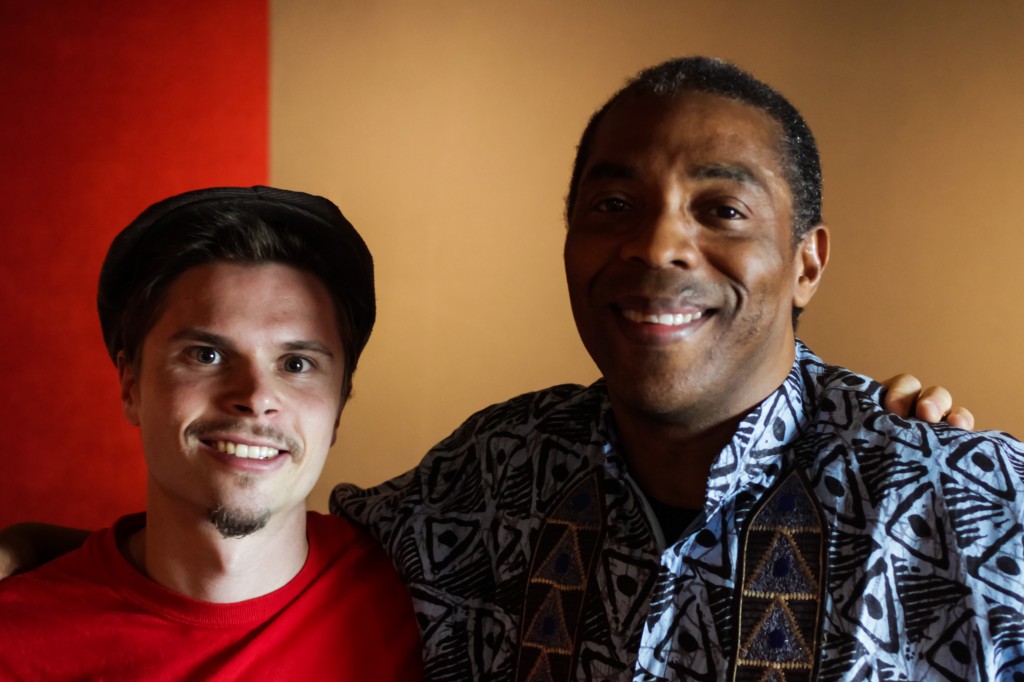A few weeks ago, Nigerian Afrobeat legend Femi Kuti was in NYC for a high-profile concert at Central Park SummerStage. He found the time in his busy schedule to come down to Mike Jones' Studio 44 in Brooklyn, where Afropop staff writer Morgan Greenstreet and Hip Deep Scholar Mark Levine (who joined the conversation via telephone from the West Coast) conducted an interview with the son of the master himself, Fela Anikulapo Kuti. Femi is presently on an eight-city North American tour in support of his new album, No Place For My Dream, which was released in June on Knitting Factory records.
M.L.: First, welcome Femi, and I understand you just celebrated your birthday, so happy birthday!
F.K.: Thank you very much, thank you. I’m very happy to be here with you all.
M.L.: Well this is, I think, your 9th original full-length album. Can you take us through some of the most important highlights and developments of your sound from your early albums in the late ‘80s, like No Cause For Alarm and MYOB, to the most recent album. What’s changed? What’s stayed the same? What styles have really influenced you along the way to develop as an artist?
F.K.: Wow, so many questions. Let me see…What styles have influenced me? My father first and foremost, that’s the basic and foundation of my music. And a lot of jazz, like John Coltrane, Miles Davis, Charlie Parker and Dizzy Gillespie, and people like this…Art Tatum. And the blues influenced me a bit, and funk as well, and Stevie Wonder. I was listening and dancing to everything that came out of America, but my father’s music was always the basic element and foundation of where I wanted to be, and why I wanted to play music in the first place.
Nobody really liked my first album, No Cause For Alarm, it was considered a very big flop. The generation of today kind of like it. It was very fast, and upbeat tempo. And, I think, probably because of my father’s kind of afrobeat, people wanted me to be the replica, and they saw me as I was being groomed to take over. And when I went so far, I deviated so far from what they were used to, it was considered very un-musical, and everyone was so much against it. All the critics in Nigeria were like, “No, we don’t accept this.”
M.L.: You clearly have tried to expand afrobeat, to expand the palate, to expand the sounds. Can you talk a little bit about how you have actually tried to take the tradition of afrobeat and bring it into the 21st century?
F.K.: I think this is probably because of the challenges I’ve had to face. First of all, breaking away from my father. I was really being groomed to take over, and then suddenly I went on like a revolution in the house! And this really was a very terrible time for me. I didn’t talk to my father for six years. I had, I mean, terrible, bad press; his fan base hated me, it was…First, you have to understand, in Africa, to go against your father’s wishes is like a big taboo. So when I did that, it was like, “How dare you!”
So, nobody wanted to listen to me. I mean I would play a concert in Nigeria, and there would be three people in the audience, and these three people were my friends, and they were just sitting there, making fun of me. And I would play for five hours, and they would say, “Get off the stage, don’t you see nobody is here? Just us! Haha! You are just a big fool!”
And I just kept going. I mean I squandered my…not squandered…I used up my mother’s money to look after the band. We went dead broke. I was at the point of just disbanding, when I got my first break, in 1988, to tour France. And this was the beginning of my international career. And so I started to make my name in Europe. Between 1988 to ’94, I was touring Europe, all the big festivals there. And Europeans were ready to listen to me, but nobody was ready to listen to me in Nigeria. But then Motown came to Nigeria and signed me on their sister company, Taboo Records, and I got my first hit in Nigeria, which was called “Wonder Wonder.” This was a massive hit in Nigeria. Nobody even believed that I wrote it; it was said that it was my father that wrote it, pretending to be me, and blah blah blah… So nobody wanted to give me my due for that number.
And it was like a big battle, a kind of psychological battle between me and the critics in Nigeria. I was being stubborn, saying like, “Oh, you don’t like me, I insist on this! So you don’t like the fast tempo I am creating? I’ll even make it faster!” Because I saw Europeans were dancing, Europeans loved what I was doing. Even when Shoki Shoki came out, the critics were first like, “What’s he doing? He has completely changed the sound of afrobeat!” I mean, you take a number like, “Truth Don Die,” the effects at the beginning was never known to be done with the afrobeat. It was like, “No, this is a taboo.”
But then “Beng, Beng, Beng” broke all the borders, it won so many awards: the World Music Award… it was winning awards all over Africa! And then the government banned “Beng, Beng, Beng” in Nigeria! So many battles.
M.G.: You were working with the producer Sodi, who you have worked with on other records, including No Place For My Dream, but that album has a dance-music vibe to the production. Since then, you seem to have gone more in the direction of live-band afrobeat. Could you talk about these choices?
F.K.: Shoki Shoki, Sodi worked with Max Sanders then, to get another kind of direction with sound production in the studio. I really love the Shoki Shoki album, but I didn’t want to lose the fact of people seeing me live. You know, sometimes artists get carried away: you create all these sounds in the studio, and you cannot make a replication live. I didn’t want to lose that and get carried away with all these dynamics you could do in the studio: throwing sounds up and down, all magical sound. I didn’t want us to lose that raw feeling of being able to always present myself live. So I think No Place for My Dream has a kind of marrying Shoki Shoki album, still keeping that very fresh, live aspect, but still throwing the sound a bit. But not as dynamic as the Shoki Shoki album.
M.L.: One of the things that strikes me from the new album is, on the one hand, you’re bringing to light all this suffering…from the title track, No Place for My Dream, you’re making sure your listeners can feel the power of the suffering. And it’s true, if you don’t travel through Africa much, it’s hard coming from a North American context, or even a European context, to understand what poverty at that level really is. But on the other hand, you have songs like The World Is Changing, which are incredibly uplifting, and give you hope for the future. And it would be horrible to reduce Africa, as so many people have done, to just suffering, when there is so much growth and so many positive things happening. But these two things…I’m still trying to figure which way I’m supposed to feel after listening to this album. Was that on purpose?
F.K.: I think I’m just doing music today as, on a global basis, not just from the African perspective. I still use Nigeria or Africa as my foundation, but I see the suffering in Spain; I see the suffering in Haiti; I see the suffering from the Arab Spring. So I talk about all those things. I try to put myself in positions of the underprivileged, when I’m singing or writing the song, because, I’m not feeling that pain personally myself. I can fend for myself. But when you put yourself on the other side, and you see somebody who is in a war-torn area, like, you see what happened in Libya, or you see what is happening in Syria right now, or you see what is going on in the Congo, or in the northern part of Nigeria… And then the most important fact you might feel in the music is the urgency for change! That there has to be change, like right now! And then you have to ask questions: what is the World Bank doing about this change? What is the United Nations doing about this change? Why does the GA keep meeting and no change, we don’t feel the impact of this change on the streets!
M.G.: Femi, when you write political lyrics (and most of your lyrics at this point are very direct, very blunt, political message) who are you trying to reach with these lyrics, and do you feel that you’ve been effective?
F.K.: I’m trying to reach people that feel helpless about the situation. Like take for instance the 99 percent that went on, that had been protesting in Spain, or in America here. Saying that people like we, we might not be on the streets with you, but we are there, we support you. And I support them through my music! And then, I think most importantly, I’m talking to people like Obama, or world leaders, that if they don’t listen to this song, and see the urgency, there is, very soon, going to be catastrophe, there’s going to be chaos everywhere. Soon it’s going to go out of hand! And I think I remember saying this as well in Europe: “We’re talking about crisis in Africa; what if this crisis comes to Europe? What would you do about it?” I did not know the impact of what I was saying then, ten years ago. And now, there’s poverty in Spain! There is no job! And if you had said this 15 years ago, that you are all going to be without a job, housing problems, credit crunch. Now it’s not just at the doorstep, it’s in the homes in America, it’s in the homes in Europe. So I’m talking to people like this. And it’s going to get worse as the days go by. And if world leaders and the World Bank and IMF don’t sit down, sincerely for once in their life, and say, “Let’s do something about this,” there is going to be uncontrollable anarchy on the streets very soon!
M.G.: So what is the role of these political messages especially in afrobeat? I mean, it’s been a big part of your music, it was a huge part of your father’s music…Do you feel that afrobeat is inherently political music? Does it need to be? Or can it be about nothing, or about partying, or about anything? [Femi laughs] Do you feel that afrobeat is the means to this message, or is it just music?
F.K.: I think afrobeat is a means to this message. Having said that, I don’t think it can be tied down to this message alone, which is what I tried to show with “Beng, Beng, Beng.” And the reason I am so adamant about singing this political message is probably because I live in Africa. Probably if I lived in France, I might have a different way of bringing this political message across. I might be more diplomatic. Maybe if I stayed in America, I might…I don’t know, maybe I might even become more radical, I don’t know. Now I would never influence anybody to do, to take my path in creating their music. I think it’s possible to sing a love song with afrobeat for instance. I would love to sing a love song with afrobeat! But every time I sit down to say, okay, let me sing about this love song, I feel so stupid. What heartbreak could I have that is more important than this mother that can’t take care of her children? Or this father that looks so stupid in society because he doesn’t have a job and he can’t feed his family? He feels so helpless and he’s down; and he never had a good education because the government failed to give him a good education.
You hear people say, “Get over it! There’s a new wave that’s come out. Oh, don’t talk about the slave trade again, Africa should get over it!” And I ask these people: “Get over 500 years of slavery? Get over 100 years of colonial rule? Get over 60 years of bad governments, corrupt African governments… And you just want this African woman or man to wake up and say, “It’s over, forget this history. I want to get on with my life.” Where is the job? Where is? How do they? Where are they supposed to start from?! Where is the foundation? They have bad education system; they have no health care services. Nigeria still has no electricity! We are the fifth biggest oil producing country in the world! So, every time I want to bring this love story, I feel so stupid singing it. The poverty that I see, or the chaos that I see; we’re heading into a kind of war, this country could erupt any minute. So what broken heart? There is no love story for me of a broken heart of mine that is more important than what will affect my children in the next five years.
M.G.: Most of the young artists in Nigeria, it seems, are steering away from politics. They are singing those love songs.
F.K.: Yeah, but it doesn’t mean they are not concerned about politics! Now, in Nigeria the bands that are political, I don’t think it’s more than myself and my brother, and then you find the music is hip-hop or African pop, afrobeats pop, whatever they call it…
M.G.: What do you think about that music?
F.K.: I love it! I play a lot with them!
M.G.: Yeah?
F.K.: I play with Wizkid, I’m playing with many of them…I mean, I’m old enough to be their father, so I’m like a father figure. So they all want me to… I’m playing sax with them now…
M.G.: Great!
F.K.: We have a very big festival, the Felabration. They are all there, every year, all of them come there for no money. So, they are very politically aware! But now, who sponsors them? It is the multi-nationals that sponsor them. Now, the multi-nationals don’t want to be seen with the Fela name, the brand Fela. Because, who gives them their license for their telecommunications for example? The government. The government just wants my father’s name to be dead and buried. “He’s dead, he died in ’97, we don’t want any more Fela.” But then you have the show of Fela on Broadway becoming very big. So when the family puts its back behind that, it puts pressure on the government in Nigeria. So, they don’t want to hear this name anymore, the name becomes bigger. The more successful Fela’s children become, the more pressure it puts. This story will not die until there is justice for Fela’s life! But if they [the young artists] are seen with this brand, they feel that the government would not give them their license because they have compromised, by saying they support the Fela family, over the corrupt government. So it’s a kind of Catch 22 thing, if you understand what I mean. Everybody knows what is going on, but everybody needs to feed their family…
M.G.: I want to ask a musical question about the new album: There are three pieces that are kind of very fast, up-tempo 6/8 rhythms, which is different from what I usually hear in your music, and your father’s music. What’s the inspiration of those kinds of rhythms? How did you come by that?
F.K.: This just came naturally, because I have not listened to music now for 13 years. I have cut off from everything. I just…And I moved from the sax to the trumpet.
M.G.: Oh!
F.K.: Yes, so I am playing more trumpet now…
M.G.: The inverse of your father! [Fela started out on trumpet and took up the saxophone later in his career]
F.K.: Yes, [Laughs]. So I’m doing more trumpet practice, and not listening to anything, not even listening to my music. I got very bored, and I needed to find change in my life. And the only way I could think about it was picking up new musical instruments that would challenge me to play. Picking up the trumpet, I thought it was going to be… I wanted to be more militant, because I was facing so much aggression with the authorities in Nigeria, and the media against me after building the Shrine. I was shocked. So I wanted to be more like my father. Or should I say my father’s character came out of me. So I wanted to be more stubborn! So if I had an Uzi, I wanted to now have a nuclear bomb!
M.G.: And so you feel that the trumpet was the nuclear bomb?
F.K.: That was my intention [Laughs]. What I think it did was, it made my music more melodious in a way that shocked me. So you have tracks like, if you go to the Day By Day, there is a number called, “Better Ask Yourself.” I started to see that my music was moving so far away that I could not understand what I was even doing, but I had to create all this sound! And I still, I will not tell you my feet are on the ground, but I’m seeing that it’s taking me to where I like, where I love, and changing so many things.
Even my personality has changed. I think I’m friendlier, I think I’m more concerned. Probably, maybe because of the events that have happened in my life, like losing my sister. Now I’m somebody that, I couldn’t stand somebody that drank for instance. “Just stop drinking!” I was very impatient. After losing my sister, something just changed; playing the trumpet, something changed. It changed so many things about my life, my perspective of thinking. And people are very surprised that I’m so patient these days. Even on Twitter, when you see me on Twitter, I’m trying to answer everybody.
M.G.: Wow. And the last track on your new album, “This is Only the Beginning”...
F.K.: Which is my favorite.
M.G.: Yeah, the instrumental track, it’s virtuosic, I mean, it’s intense!
F.K.: Yes it comes from, all of it comes from the trumpet. And in the beginning, when I wrote this, I could not play it on the trumpet. It was giving me inspiration that I could not do as a trumpeter. So that was very frustrating, but this frustration, I managed to tone it down into becoming a nicer person. Because I couldn’t play it, I would give another musician this very difficult part, and I would console myself with the fact that, well I can do it on the sax. But I want to do it on the trumpet!
Let me put it in a battle way: I think the sax, I saw it like a sub-marine; I see the organ as the tanks, and I see the trumpet as the planes…or something like that…So I did this kind of dynamics in my mind. I said, Okay, this is a war game, but a psychological war game. So I’m going to use my trumpet as airfield, and this as this, and this as that.
M.G.: And this is “only the beginning” so…
F.K.: Yes, this is just the beginning of this war. So okay, let’s see: Femi is standing now, he is doing quite well with the organ, he’s doing very well with his sax, he’s playing the trumpet very well. Now, now, unfortunately for them, they don’t even know how well I’m doing with the trumpet, except me! I know I’m really pacing myself very well with the trumpet these days!
M.G.: Excellent. Well, I think we have to wrap up.
M.L.: Listen Femi, thank you so much, the album is amazing!
F.K.: Thank you very much.








